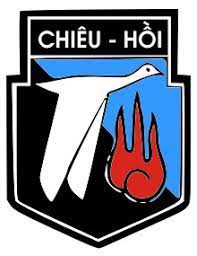Top Qs
Timeline
Chat
Perspective
Chieu Hoi
US, South Vietnamese defection program From Wikipedia, the free encyclopedia
Remove ads
The Chiêu Hồi program ([ciə̯w˧ hoj˧˩]) (also spelled "chu hoi" or "chu-hoi" in American documents; loosely translated as "Open Arms"[1] or "Return") was an initiative by the United States and South Vietnam to encourage defection by the People's Army of Vietnam (PAVN) and Viet Cong (VC) and their supporters to the side of South Vietnam during the Vietnam War. According to U.S, 101,511 PAVN/VC defected under the program[2] but one analyst speculates that fewer than 22% of those were genuine, the rest were merely seeking temporary respite from the conflict before slipping back into the PAVN/VC base, while others were not Vietcong but seeking monetary gain.[3]

Remove ads
Campaign
Summarize
Perspective

Defection was urged by means of a propaganda campaign, usually leaflets delivered by artillery shell or dropped over enemy-controlled areas by aircraft, or messages broadcast over areas of South Vietnam.[1] A number of incentives were offered to those who chose to cooperate, along with psychological warfare to break enemy morale.


To further this aim, invitations to defect, which also acted as safe conduct passes, were printed on clear plastic waterproof bags used to carry ammunition for the U.S. soldiers' M16 rifle. Each bag held one magazine and was sealed to prevent moisture from the jungle's humid climate from damaging the contents. When the magazine was needed during a firefight with the enemy, the bag would be torn open and discarded, in the hope that it would later be discovered by enemy troops who would read the text and consider defection.
In 1969-1970, approximately 79,000 defections had been recorded, but analysts speculate that less than 17,000 of those (21.5%) were genuine.[clarification needed][3] The program had some difficulty catching on, due in part to culture gap—errors, such as misspellings and unintentionally offensive statements—and worsened by communist reprisals against defectors and their families.[4][5] To make matters worse, as testified by Sergeant Scott Camil during the 1971 Winter Soldier Investigation, the passes were sometimes ignored by U.S. forces, and their holders shot while surrendering.[6]
Overall, however, the Chieu Hoi program was claimed successful by the U.S government[7] Those who surrendered were known as "Hoi Chanh" and were often integrated into allied units as Kit Carson Scouts, operating in the same area where they had defected. Many made great contributions to the effectiveness of U.S. units, and often distinguished themselves, earning decorations as high as the Silver Star.[1]
Remove ads
Related people
References
Sources
Further reading
External links
Wikiwand - on
Seamless Wikipedia browsing. On steroids.
Remove ads
